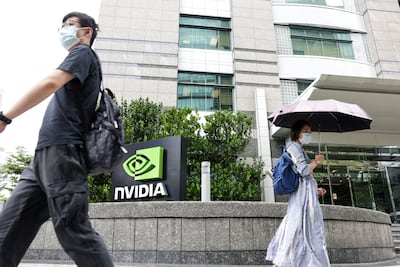If there is one thing that unites investors all over the world right now, it is that they all wish they had bought Nvidia's shares on the first trading day in January.
The New York-listed technology company's share price has rocketed 177.82 per cent since opening at $143.15 on January 3, and who would not want a piece of that?
On May 25, its market capitalisation jumped by an incredible $200 billion in a single day. As its shares topped $400, it secured prized membership of the unofficial trillion-dollar club, companies whose total market cap tops $1 trillion.
This has thrust the chip maker into exclusive territory alongside US technology rivals Apple ($2.83 trillion), Microsoft ($2.47 trillion), Google owner Alphabet ($1.58 trillion) and online retailer Amazon ($1.26 trillion).
Nvidia has raced ahead of former technology flyer Tesla, whose market cap has been reduced to “just” $650 billion, and Facebook owner Meta Platforms ($698 billion).
Nvidia’s success has propelled chief executive Jen-Hsun Huang into the limelight as Silicon Valley’s latest cult tech figure, known for his leather jackets and the Nvidia logo tattooed on his arm.
This is no overnight success story. Nvidia was launched in 1993 at a roadside Denny’s restaurant and was an established a leader in graphics processing units for video games, mobile computing, supercomputing and automotive markets, before the world woke up to its potential role in the artificial intelligence revolution.
AI and machine learning are the most exciting things in investing today, as ChatGPT takes the world by storm.
Brushing aside warnings that it could destroy millions of white-collar jobs and, possibly, humanity, investors are hoping it will make their fortunes like those other trillion-dollar US techies did before last year’s meltdown.
Investors who missed the Nvidia bonanza must stop kicking themselves and ask this simple question: Are its shares still a good investment today?
Nvidia has captured the imagination of investors who are scrambling to reap the huge financial benefits from the AI boom, says Richard Hunter, head of markets at trading platform Interactive Investor.
The recent upsurge was triggered by its second-quarter revenue forecast of $11 billion, more than 50 per cent above Wall Street’s $7.2 billion estimate.

The danger is that Nvidia’s stratospheric share price performance has raised investor expectations so high that the company will struggle to fulfil them.
Derren Nathan, head of equity research at Hargreaves Lansdown, says AI is helping Nvidia to buck today’s weak semiconductor market, and it is starting to look pricey.
“Its valuation now stands at an eye-watering 23 times forecasted full-year sales and nearly 60 times earnings,” he says.
With analysts predicting sales growth of only 21 per cent, these multiples look a little rich, Mr Nathan cautions.
“Unless Nvidia’s growth accelerates to justify these heady heights, that valuation will moderate,” he says.
All this excitement is in danger of blurring the fundamentals and creating volatility further down the track, he says.
Yet, others reckon Nvidia has further to go, including Claire Shaw, portfolio director at Scottish Mortgage Investment Trust, which has held Nvidia's stock since 2016.
Ms Shaw says it looks set to be a foundational company in the fast-developing AI ecosystem, along with another long-standing Scottish Mortgage portfolio holding, ASML, which makes lithography equipment used in chips.
“They are set to be a beneficiary of the rapid adoption of generative AI and machine learning technologies, given their unparalleled competitive advantage,” she says.
Chris Ford, head of growth equities at Sanlam Investments, also sees more Nvidia upside amid a “pressing scarcity of high-powered computing capacity” to drive the AI revolution.
Nvidia plays an integral role in processing vast volumes of data required by AI in its industry-leading products, with Advanced Micro Devices the only other realistic contender.
“The ultimate challenge lies in Nvidia’s ability to meet overwhelming demand and build the necessary infrastructure,” Mr Ford says.
The world has woken up to the pace and magnitude of change that AI will present and Nvidia is in prime place to capitalise, he says.
Private investors are not just playing the AI revolution through Nvidia, says Ben Laidler, local market strategist at trading platform eToro.
Its customers are piling into established technology business Intel, which also makes hardware used by AI companies. Yet its stock is up just 16.46 per cent this year.
C3.ai, a software company developing AI solutions for businesses, is also popular and its stock is up 213.64 per cent so far in 2023.
Other popular stocks on the eToro platform include OpenAI backer Microsoft, AI cyber security company SentinelOne (up 42.21 per cent so far this year) and chip maker AMD, which also makes hardware for developing and testing AI, and is up 86.61 per cent.
head of equity research, Hargreaves Lansdown
Picking winners in fast-growing and emerging technology such as AI is notoriously risky, Mr Laidler says, and eToro data suggests that investors are avoiding pure AI plays in favour of “enabling firms such as Nvidia, AMD and Intel”.
“They appear to have learnt the lessons of the California gold rush, where the shovel sellers struck it rich rather than the prospectors,” he says.
Investors who want to spread their risk further could choose an AI exchange-traded fund such as the Global X Robotics & Artificial Intelligence ETF, where Nvidia is now the top holding at 11.79 per cent of the portfolio.
There are plenty of other ETFs, including the iShares Robotics and Artificial Intelligence Multisector ETF and the Global X Artificial Intelligence & Technology ETF.
Nvidia’s success is another blow for former “disruptive tech” favourite, Ark Innovation ETF, as its star manager Cathie Wood sold Nvidia shortly before it took off like a rocket.
There are signs that Mr Huang is aware of the dangers of Nvidia’s sudden rise, offering only cautious guidance for the rest of the year, says Russ Mould, head of investment at AJ Bell.
"Recall that Nvidia had a terrible finish to 2022, with sales falling 16 per cent in the third quarter and 21 per cent in the fourth quarter, as end markets slowed, IT budgets were cut and inventories piled up through the technology supply chain.”
Mr Mould also says that while Nvidia designs silicon chips, it outsources production to Taiwan Semiconductor Manufacturing, which offers “downbeat” guidance for the second quarter.
“This could also be seen as a red flag,” Mr Mould warns.
Watch: Artificial intelligence – is it getting out of control?
Nvidia is not the only US technology stock booming right now, with Meta Platforms and Tesla both doubling, and Amazon, Apple and Alphabet up about 40 per cent.
Technology is a rare bright spot in a year affected by the war in Ukraine, the US debt ceiling crisis, stubbornly high inflation and recession fears.
Yes, investing today is risky and it may be worth holding back for a dip, rather than joining the bandwagon at this stage.
Big technology companies have shown that $1 trillion does not have to be a barrier to further growth, but investors should not expect Nvidia to double their money in the second half of the year, too.

